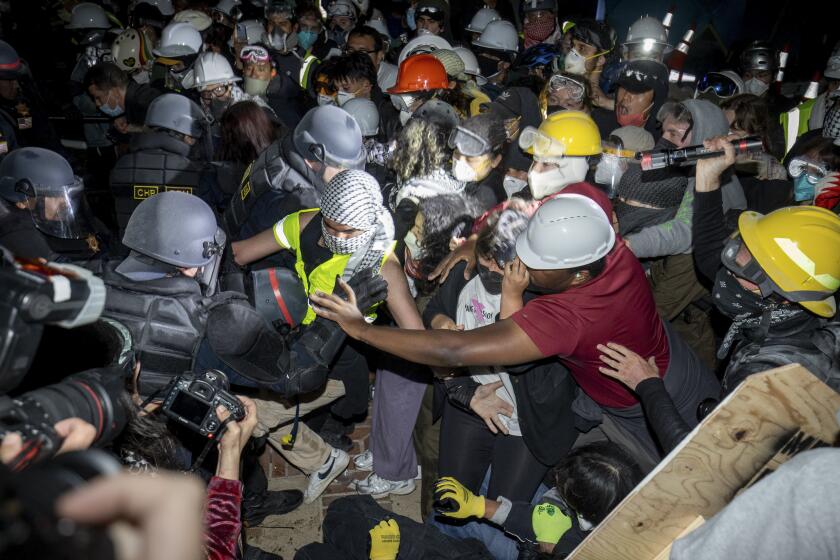Rebel or Pacifist--Mexican Uprising Divides Villagers
Pedro Perez and his neighbor, Gustavo, spent their youth picking coffee and herding cattle for ranchers at the edge of the southern Mexican highlands and their middle age trying to carve a living from the jungle.
For two decades, they have worked together--mostly in vain--to demand basic education, health care, water and access to this village, which is now a four-hour trek over muddy trails from the nearest dirt road.
But in the last week of December, their lives, which had been so similar, diverged sharply.
Gustavo, who asked that his last name not be used, covered his face with a bandanna, took up an old rifle and marched into the county seat of Ocosingo with the rebel forces that took over a handful of towns in southern Mexico on New Year’s Day.
Perez stayed home, convinced that armed rebellion is not the solution to their problems.
When the rebels marched out of Ibarra, toward their targets, they left a divided community.
In the weeks after the New Year’s Day debut of the Zapatista National Liberation Army, as the rebels call themselves, the split has become even deeper.
The same difference of opinion has divided many local villages.
Last week, as Zapatista representatives sat down with the government for the first time to try to negotiate a peace agreement, communities throughout the rebels’ jungle stronghold were also attempting to heal the wounds left by the rebellion.
While negotiators have said they are nearing agreement on the political and economic rights that are at the heart of the rebel demands, few details have been released.
But here in the jungle, the divisions are clear.
The uprising has split families, setting off charges and counter-charges that range from theft to betrayal.
“All of the towns here are divided,” said Armando Cruz as he lugged a 100-pound bag of salt though calf-deep mud up the trail toward Ibarra.
Cruz and Perez were carrying essential supplies--salt, soap and medicine--to their village from the airstrip at Santa Lucia, a two-hour hike away and one of the few towns in the area without a significant Zapatista presence.
In towns that the rebels control, they have scattered logs and driven poles into the airstrips--which already are little more than clearings hacked out of the jungle. Their sabotage has cut off an essential means of transportation in these remote communities.
In addition, men claiming to be guerrilla sympathizers have blocked overland traffic into the Zapatista-controlled area, which includes most of the Montes Azules Biosphere Reserve and surrounding area.
The blocked roads have become a major source of friction between Zapatistas and pacifists.
The rebels say they fear military incursions if planes and vehicles are allowed into the area. Their neighbors angrily watch their supplies disappear and their only cash crop, coffee, rot.
“We are like prisoners here,” the graying, paunchy Perez said.
His son Alberto, the community’s volunteer health promoter--as close as the village comes to having a doctor--said one diabetic woman died in childbirth during the early days of the conflict.
No planes were flying to take her to the nearest hospital, which is three hours away on foot.
Alberto worries that more deaths will follow unless the roads and airstrips are opened soon.
Even if traffic could resume tomorrow, it will be too late for most of the coffee crop.
The consequences of that loss will be devastating.
Although Ibarra produces bananas and citrus fruit, the only crop that can survive the three-day walk to the nearest market in Ocosingo is coffee. The crop is harvested in December and usually sold in January. Not this year.
Cruz, like many of his neighbors, has bags of rotting coffee sitting in his wood-plank, palm-roofed hut. Because he could not sell his coffee, Cruz explained, he will not be able to buy clothing for his six children, ages 2 to 11, or to replace his worn, year-old machete and file.
Without a usable machete, he cannot clear the undergrowth that has overtaken his corn and bean fields since last fall’s harvest or even walk through the jungle.
“We are going to die of hunger,” he predicted grimly.
But Gustavo and the village’s other Zapatistas--24 families in all, versus 53 pacifist households--argue that the community is already dying of hunger.
“We have been struggling for 20 years, and we are tired of begging our government to pay attention to us,” he said at a candle-lit meeting that the rebels called to meet two visiting reporters.
“Here we are in the jungle, shafted,” he said. “We have no road, we have no hospital, we have no decent teachers. We have no sugar or salt or any more money for collections to send representatives to talk to the governor and be ignored.”
Unlike the masked, uniformed rebels who appeared in the cities during the brief occupation and have posed since for cameras at the edge of the jungle, Gustavo and his neighbors wore civilian clothes to greet their visitors. The meeting was arranged on condition that no last names or ranks would be published.
Most of the Zapatistas refused to give even a first name.
Like their leaders, these grass-roots rebels say they will not give up their guns.
“We will be at peace, but we will never give up our arms,” said a young man in a palm leaf cowboy hat. “If we turn them in, everything will go back to the way it was.”
Gustavo’s list of grievances was the same as those expressed at a pacifist community meeting that afternoon.
The similarity was no coincidence: Until a year ago, the two groups were members of the same rural association, the organization that sent the community emergency supplies.
The Zapatistas claim that the rural association actually recruited and organized the armed groups a decade ago. But the leaders sold out to the government a year ago, they charge.
The pacifist version is that the rural association was never involved in the armed struggle. The split occurred a year ago over the issue of schoolteachers, the pacifists said.
Both groups agree that teachers sent to the village by the federal government have played hooky a lot over the years.
The rebels blame the problem on the government’s notorious laxity in paying rural schoolmasters. They believe that the solution is to pay teachers well and regularly.
The rural association, on the other hand, decided that city-bred teachers just could not cut it in the jungle. The solution, according to the organization, was community teachers, people from the village who would receive short courses in teaching.
Community teachers are supposed to have finished junior high school. However, to attend junior high, students from the jungle have to go to boarding school in the city, which few families here can afford.
As a result, only two people in the village have an eighth-grade education, and the village’s 74 children need three teachers.
Further, instead of a full salary, community teachers would receive “a gratuity” of $150 to $200 a month.
Furious, a group that later identified themselves as Zapatistas pulled their children out of school and refused to pay their share of the village’s $1,500 property tax bill.
They argued that without government teachers, the only service the village received from the government had been withdrawn. Therefore, they argued, there was no reason to pay taxes.
“They want to keep us ignorant,” said one rebel, who did not identify herself. “Children do not learn well without a qualified teacher.”
Perez’s 23-year-old son, also called Pedro, is one of the community teachers.
Such comments hurt, he said. He had worked hard to attend junior high school, supporting himself with a job as a hotel receptionist while he studied in San Cristobal de las Casas. He would have liked to finish school, but the family’s money ran out, he said.
“I see how the children are learning,” he said in defense of his teaching abilities. “They are doing much better.”
Still, it was not the dispute over the teachers but the changes that came after that have been the most divisive.
The Zapatistas, who had been training secretly, according to the pacifists, began marching on the village square. They stopped attending village celebrations and discouraged their children from playing with friends whose parents were pacifists.
Then, one morning in late December, five of the men marched off with guns.
When they came back in early January, they told neighbors that they had helped take Ocosingo, site of the heaviest fighting in a conflict that has claimed more than 100 lives.
The Ibarra rebels said they were able to leave Ocosingo before the federal army arrived, and thus escaped the battle. When they returned home, it was to a town in rebel-held territory.
Throughout the area, Zapatistas became more assertive.
Here, they removed benches from the church, taking them to the rebel “security house.”
In neighboring Santa Helena, where guerrilla sympathizers are the majority, they confiscated the community shortwave radio.
They set up checkpoints on the paths between towns and searched everyone who tried to pass. Those who refused to be searched were escorted back to their villages.
Except for the radio and the benches, pacifists admit, the rebels have taken nothing. Pacifists claim to have been threatened, but demur if asked when and by whom and what was said.
Both groups said they want a reconciliation. But the wounds run deep. A pacifist from Santa Helena named Pedro said in the presence of rebels that none of his relatives were involved with the Zapatistas.
Afterward, one of the rebels said sheepishly, “He is my brother.”
Significantly, neither side claims to be pro-government.
“The government has not done a single thing we have ever requested,” said Pedro from Santa Helena. The difference is whether they believe that fighting will solve the problem.
“I am not a Zapatista because I have six kids to feed and I do not want to die,” Cruz said.
However, one of his Zapatista neighbors said he is willing to die for precisely the same reason.
“Our children are sickly because they are malnourished,” he said. “We have risen up in arms because we cannot take any more.”
More to Read
Start your day right
Sign up for Essential California for news, features and recommendations from the L.A. Times and beyond in your inbox six days a week.
You may occasionally receive promotional content from the Los Angeles Times.






